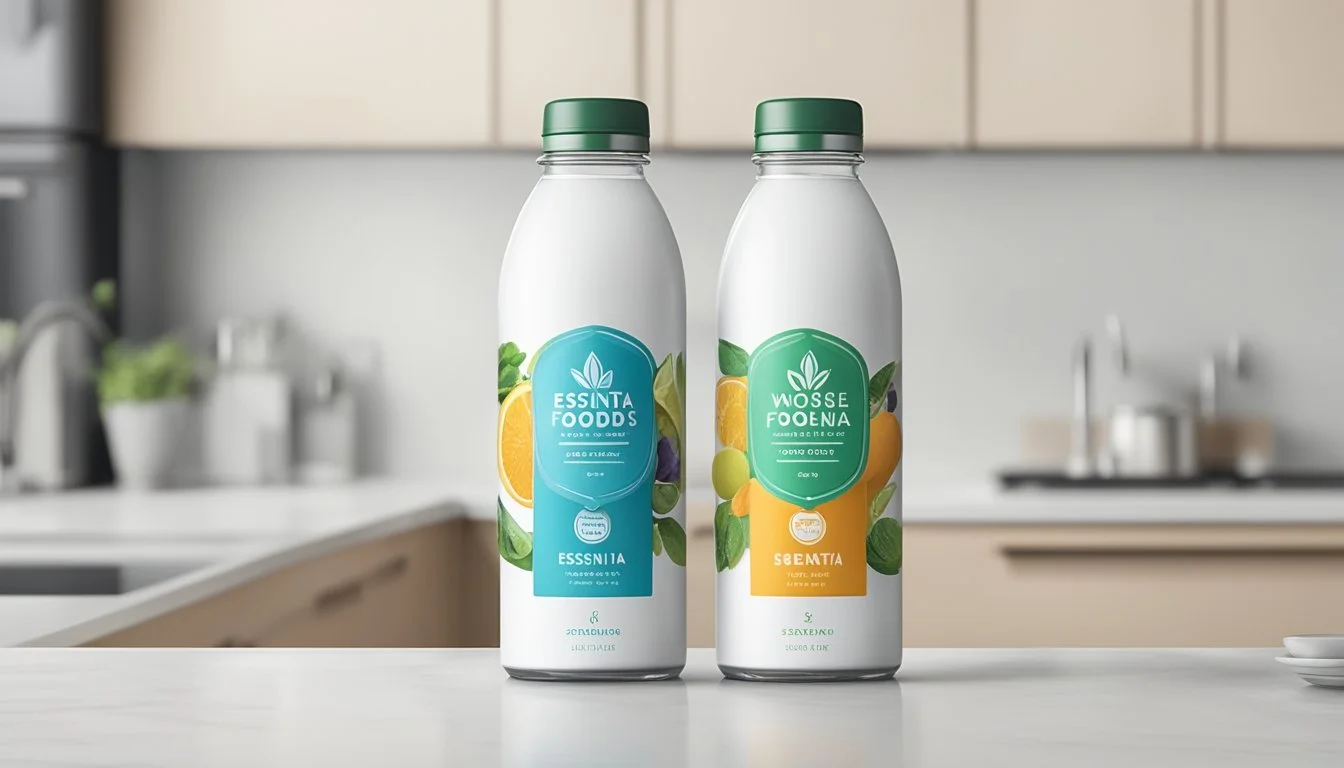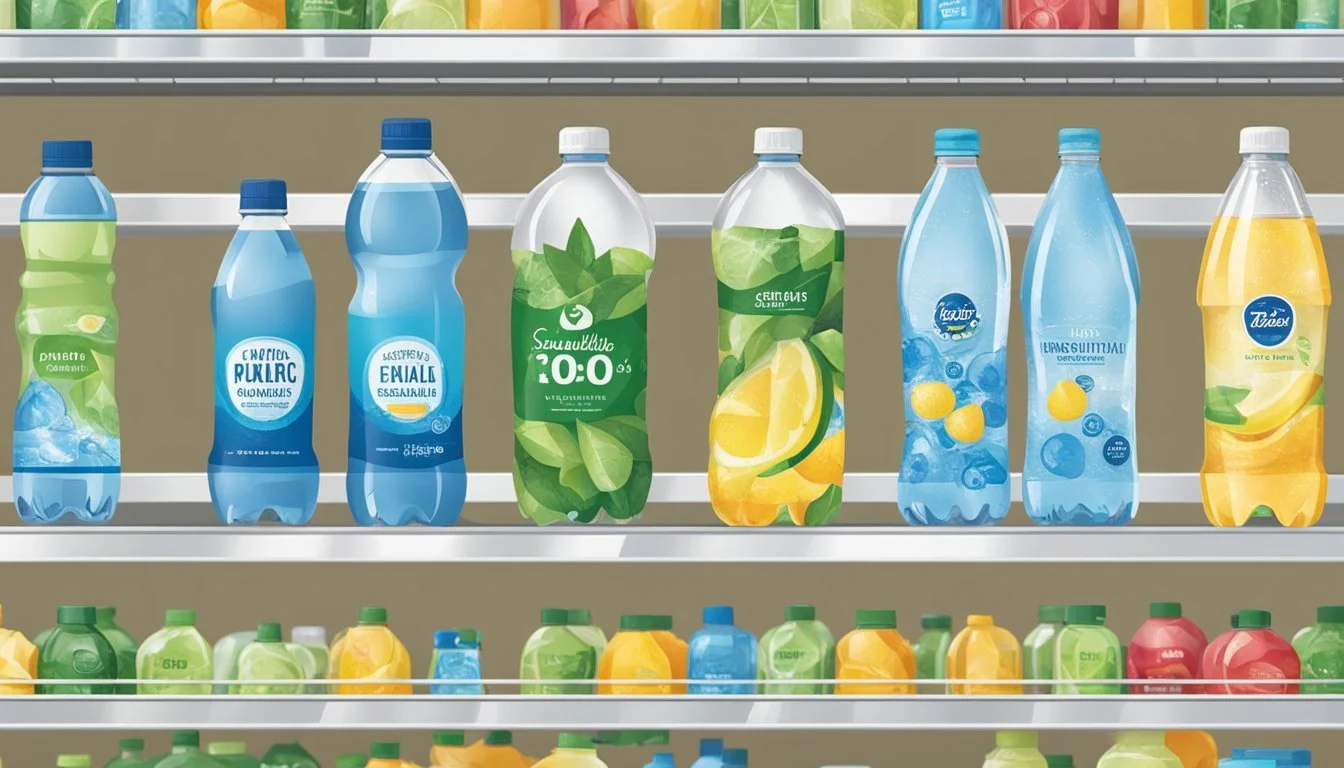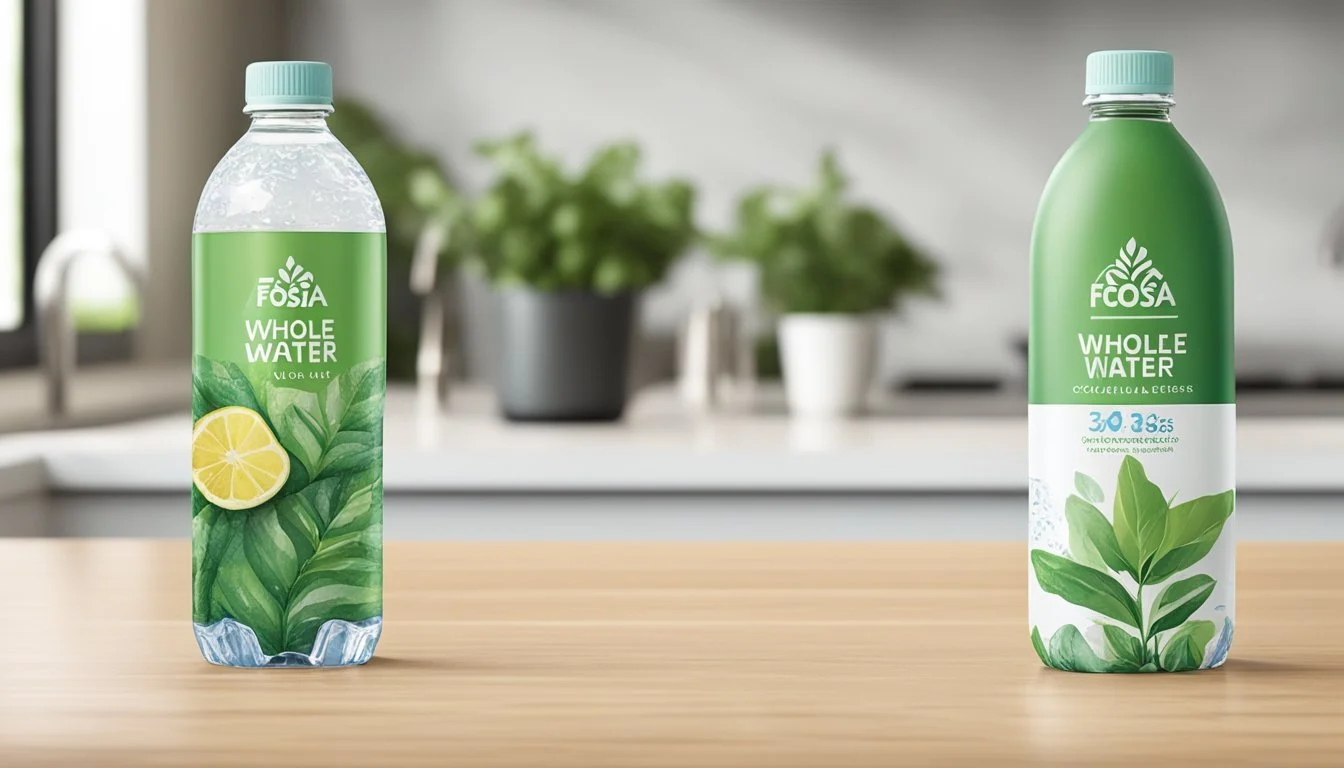Essentia vs. Whole Foods 365
A Comparative Bottled Water Review
Bottled water has become an essential part of daily life, especially for those seeking convenience and perceived health benefits. Essentia and Whole Foods 365 are two prominent options that cater to different consumer preferences. Essentia promotes its ionized, alkaline water, which claims to offer superior hydration with a higher pH level. Whole Foods 365, on the other hand, provides an affordable spring water option that appeals to budget-conscious shoppers.
For those prioritizing hydration quality, Essentia may offer an edge with its unique ionization process and higher pH level. This process is marketed to enhance the water’s ability to hydrate the body more effectively. While some consumers might appreciate these features, it's important to note that such benefits have not been definitively proven to be necessary for most people.
Whole Foods 365 provides a straightforward, no-frills option that is readily available and economically accessible. At 69 cents per bottle, it's a practical choice for those looking for basic hydration without the added price tag of specialty waters.
Understanding Bottled Water
Choosing bottled water involves understanding various types available on the market, knowing regulatory standards for safety, and considering the environmental impact of containers.
Types of Bottled Water
Bottled water comes in multiple forms, each differing in source and treatment method. Spring water originates from natural springs and is typically collected at the formation point. Purified water undergoes processes like distillation, deionization, or reverse osmosis to remove impurities.
Mineral water is another variant, containing naturally occurring minerals and salts from underground sources. Alkaline water, such as Essentia, boasts higher pH levels, potentially offering different health benefits. Enhanced water incorporates added flavors, vitamins, or electrolytes to offer more than simple hydration.
Regulatory Standards and Safety
Bottled water is regulated to ensure safety and quality. In the United States, the Environmental Protection Agency (EPA) oversees tap water, while the Food and Drug Administration (FDA) regulates bottled water. The FDA enforces standards similar to those of the EPA to maintain safety.
Producers must meet federal limits for contaminants such as lead, bacteria, and other harmful substances. Some brands also market BPA-free plastic bottles to alleviate concerns over chemical leaching. Strict labeling requirements help consumers make informed choices by clearly listing water sources and treatment methods.
Environmental Impact of Bottles
Environmental concerns are significant when evaluating bottled water. Plastic bottles, usually made from polyethylene terephthalate (PET), are highly recyclable but often end up in landfills, contributing to pollution. BPA, a chemical sometimes present in plastics, can pose health risks, although many brands now utilize BPA-free materials.
Glass bottles, while heavier and more costly to transport, are recyclable and considered less harmful to the environment. The production and disposal of bottled water containers strain natural resources and present challenges for waste management. Consumers are encouraged to recycle and opt for reusable bottles to mitigate environmental impact.
Brand Overviews
Essentia and Whole Foods 365 are both popular bottled water brands, each with unique attributes. This section explores key aspects of these two brands and briefly mentions other notable competitors.
Essentia Water Profile
Essentia Water positions itself as a high-quality, alkaline water brand. It boasts a pH level of 9.5 or higher, which is achieved through a proprietary ionization process. This makes it appealing to those who believe in the potential health benefits of alkaline water.
Key Points:
pH Level: Over 9.5
Process: Proprietary ionization
Target Audience: Health-conscious consumers
Essentia emphasizes purity and hydration, highlighted by its high-pH ionized water, claiming it provides superior hydration compared to standard bottled water. Its branding targets those interested in wellness and fitness, seeking a premium hydration solution.
Whole Foods 365 Water Profile
Whole Foods 365 water is marketed under the Whole Foods Market brand, known for its commitment to natural and organic products. This spring water has a taste that some reviewers describe as average, with a slightly dry aftertaste.
Key Points:
Type: Spring water
Price: Affordable
Taste: Slightly dry, average
Whole Foods 365 water is often chosen for its cost-effectiveness and association with the Whole Foods brand. It's positioned as a trustworthy, everyday water option without the premium price tag attached to brands like Essentia.
Competitor Water Brands
Numerous other bottled water brands compete in the market, each with its own unique selling propositions and target audiences.
Notable Competitors:
Nestlé: Known for several brands like Pure Life and Poland Spring.
Fiji: Famous for its artesian water sourced from Viti Levu.
Evian: Sourced from the French Alps, positioned as a premium brand.
Poland Spring: A popular spring water brand from Maine.
Deer Park: Another spring water brand, also under the Nestlé umbrella.
Perrier: Renowned sparkling water known for its distinctive bubbles.
Smartwater: Offers vapor-distilled water with added electrolytes.
Each competitor has its distinct attributes whether it's the source of the water, the processing method, or additional features like carbonation. Brands like Fiji and Evian emphasize natural sources, while Smartwater focuses on added electrolytes for enhanced hydration.
Health and Hydration
Both Essentia and Whole Foods 365 bottled waters offer unique benefits when it comes to hydration and health. This section examines these aspects, focusing on hydration benefits, the importance of electrolytes and minerals, and potential contaminants.
Benefits of Hydration
Proper hydration is essential for maintaining overall health. Essentia water, with its alkaline pH level of 9.5, claims enhanced hydration benefits compared to regular water. This higher pH can aid in neutralizing acid in the bloodstream, potentially improving oxygen levels.
Whole Foods 365 water is often sourced from natural springs, ensuring a consistent and reliable hydration source. Staying hydrated helps maintain kidney health, supports cognitive functions, and aids in physical performance, making quality hydration crucial for daily routines.
Electrolytes and Mineral Content
Electrolytes play a vital role in maintaining the body's fluid balance and ensuring proper muscle function. Essentia water includes added electrolytes like potassium, magnesium, and calcium.
Whole Foods 365 water also contains natural minerals, though the specific content can vary depending on the source. These minerals, absorbed directly through the water, can positively impact muscle function and prevent cramps, especially important during exercise.
Concerns About Contaminants
Contaminants such as lead, arsenic, mercury, and PFAS chemicals are concerns for any bottled water brand. Essentia and Whole Foods 365 claim rigorous testing to ensure their products are free from harmful levels of these substances.
Reports have highlighted potential risks of PFAS chemicals in various bottled waters. While both brands strive to maintain high-quality standards, consumers should remain mindful of updated testing results and industry reports for the safest hydration choices.
Taste and Water Sommeliers
Evaluating bottled water involves understanding its taste, the influence of water sommeliers, and expert reviews. This section will cover the factors affecting taste and insights from experts.
Factors Affecting Taste
The taste of bottled water depends on various factors like source, mineral content, and processing methods.
For instance, spring water often retains natural minerals affecting taste, while purified water removes these, leading to a more neutral flavor. Whole Foods 365 spring water has been noted for its sour and dry aftertaste, reflecting its mineral content. Essentia, with its ionization process, aims to enhance hydration and offers a smoother taste profile.
Other elements like pH level and temperature also play critical roles. Higher pH waters, like Essentia, tend to have a slightly different mouthfeel compared to lower pH waters.
Role of Water Sommeliers
Water sommeliers specialize in identifying and describing the qualities of different waters.
They undergo training to discern subtle differences in flavor, mouthfeel, and aftertaste. Their expertise is crucial in guiding consumers toward premium water brands and enhancing appreciation for water's complexity.
These experts will often profile water based on its mineral content, source, and processing techniques. Their assessments help demystify the choices available to consumers, making it easier to differentiate between water brands like Essentia and Whole Foods 365.
Tasting Reviews by Experts
Expert reviews provide valuable insights into the sensory qualities of bottled waters. According to the Los Angeles Times, Whole Foods 365 water tastes sour with a dry aftertaste, indicating its mineral composition.
Essentia consistently receives high marks for its smooth and clean taste, which experts attribute to its ionization process and high pH level.
These reviews are often based on blind taste tests by water sommeliers and other experts who evaluate factors like clarity, balance, and overall drinking experience. Detailed tasting notes can help consumers make informed choices based on their personal preferences for taste and purity.
Packaging and Sustainability
Essentia and Whole Foods 365 approach packaging and sustainability with different philosophies, affecting both environmental impact and consumer health.
Plastic vs. Glass Bottling
Essentia uses plastic bottles made from polyethylene terephthalate (PET). These are lightweight and convenient but pose recycling challenges and environmental concerns due to their non-biodegradable nature. Plastic can also contain BPA, a chemical linked to various health risks.
Whole Foods 365 typically offers water in PET plastic bottles as well. However, they have explored offering water in glass bottles, which are more environmentally friendly and recyclable. Glass does not leach chemicals, ensuring a cleaner taste. The downside is the higher production cost and the heavier weight, making transportation less efficient.
Eco-Friendly Initiatives
Essentia emphasizes their Alkaline Water Process, but their eco-friendly initiatives are less publicized compared to some competitors. They do offer recycling programs but lack comprehensive sustainability claims.
Whole Foods 365 has integrated various green initiatives, including reducing plastic use across their product lines. They promote sustainable water sourcing and encourage recycling through clear labeling. While both brands have room for improvement, Whole Foods 365’s commitment appears more robust in terms of sustainability efforts.
Consumer Choices and Impact
Consumers choosing Essentia benefit from ionized alkaline water, marketed for its potential health benefits. Yet, this comes with a higher environmental footprint due to plastic waste.
Those opting for Whole Foods 365 have the option of glass, reducing plastic pollution. This choice supports more sustainable practices, though it might come at a higher price and inconvenience in terms of transport weight.
Ultimately, consumer awareness and prioritizing eco-friendly options can drive market change. Reducing plastic use and opting for sustainable packaging are significant steps toward minimizing environmental impact.
Pricing and Accessibility
Essentia and Whole Foods 365 water products offer distinct pricing and availability options that cater to different consumer needs and preferences. Each has its own unique advantages in terms of cost and retail presence.
Cost Comparison
Essentia water tends to be more expensive due to its higher pH level and targeted marketing towards a fitness-oriented audience. A 1-liter bottle of Essentia water often costs around $1.29. This premium price reflects its positioning as a high-end hydration solution.
Whole Foods 365 water offers several variants at more competitive prices. 365 Everyday Value Alkaline Water costs around $1.29 per liter, comparable to Essentia. 365 Everyday Value Electrolyte Water and Spring Water are more affordable, priced at $0.79 for a 500 mL bottle. The variety allows customers to choose based on both their hydration needs and budget constraints.
Availability in Grocery Stores
Essentia water is widely available in major grocery store chains and specialty health stores across the country. It is also accessible online through various e-commerce platforms. This extensive distribution network ensures that fitness enthusiasts and everyday consumers can easily find Essentia water.
Whole Foods 365 water products are exclusive to Whole Foods Market stores, limiting their accessibility to locations where these stores are present. However, Whole Foods' reach is expanding, making the 365 water line more accessible to a broader audience. Additionally, Whole Foods offers online shopping options, increasing convenience for consumers who prefer home delivery.
Both brands cater to different demographics, with Essentia aiming at those seeking premium hydration and Whole Foods 365 targeting budget-conscious yet quality-focused shoppers.
Consumer Preferences and Trends
Consumer preferences in bottled water reveal diverse trends, shaped by factors such as type (carbonated vs. noncarbonated), the appeal of alkaline water, and the entry of emerging brands in the market.
Noncarbonated vs. Carbonated Options
Noncarbonated bottled waters are often favored for their simplicity and widespread availability. Brands like Whole Foods 365 offer accessible spring water options that cater to everyday hydration needs.
Carbonated waters, on the other hand, attract those seeking a fizzy alternative. Consumer Reports highlighted concerns about PFAS chemicals in some carbonated brands, emphasizing the need for transparency in the market.
Combined, both options reflect a broad spectrum of consumer lifestyle choices and preferences.
Growth of the Alkaline Water Segment
Alkaline water, such as Essentia with its pH of 9.5 or higher, appeals significantly to health-conscious consumers. These products claim benefits like improved hydration and better taste.
The alkaline water segment has seen robust growth due to marketing focused on wellness and purported health advantages. Essentia's positioning as a premium brand underscores its status among discerning buyers who prioritize specific health benefits in their water choices.
Emerging Water Brands
New brands continuously enter the bottled water market, driven by consumer demand for variety and innovation.
Companies that emphasize transparency and sustainability, like Flow, gain traction among environmentally conscious consumers. These newcomers often highlight unique selling points, such as eco-friendly packaging or mineral content.
Emerging brands diversify the choices available to consumers, challenging established names and pushing the industry towards continual improvement.
Conclusion
Essentia water presents itself as a strong contender with its high pH level, typically over 9.5, which makes it one of the more alkaline options available. This can be appealing for those looking for an alkaline water choice.
Whole Foods 365, on the other hand, is a spring water that is noted for its affordability and availability. Priced at around 69 cents, it provides a budget-friendly option without severe compromises on taste or quality.
Essentia also includes added electrolytes, which can benefit those seeking hydration support from their bottled water. The presence of minerals enhances the flavor profile, making it a preferred choice for some consumers.
Whole Foods 365 has been described as having a taste similar to other purified waters but with a somewhat dry aftertaste. This makes it an average choice in terms of flavor, but still a functional option for daily hydration needs.
Both brands offer unique benefits: Essentia's high alkalinity and added electrolytes versus Whole Foods 365’s affordability and accessibility. Each water brand meets different needs based on consumer preferences and priorities.
More About Essentia
Essentia vs Cascade Mountain: Which Bottled Water is Better?
Essentia vs Hawaiian Springs: Which Bottled Water is Better?
Essentia vs Icelandic Glacial: Which Bottled Water is Better?
Essentia vs Kirkland Signature: Which Bottled Water is Better?
Essentia vs Mountain Valley Spring Water: Which Bottled Water is Better?
Essentia vs Nestle Pure Life: Which Bottled Water is Better?
Essentia vs Richard's Rainwater: Which Bottled Water is Better?
Essentia vs Talking Rain AQA: Which Bottled Water is Better?
Essentia vs Whole Foods Italian Still Mineral water: Which Bottled Water is Better?
More About Whole Foods 365
Acqua Pana vs Whole Foods 365: Which Bottled Water is Better?
Alkaline88 vs Whole Foods 365: Which Bottled Water is Better?
Antipodes vs Whole Foods 365: Which Bottled Water is Better?
Aqua Carpatica vs Whole Foods 365: Which Bottled Water is Better?
Arrowhead vs Whole Foods 365: Which Bottled Water is Better?
Big Chill vs Whole Foods 365: Which Bottled Water is Better?
Boxed Water vs Whole Foods 365: Which Bottled Water is Better?
Cascade Mountain vs Whole Foods 365: Which Bottled Water is Better?
Castle Rock vs Whole Foods 365: Which Bottled Water is Better?
Core Hydration vs Whole Foods 365: Which Bottled Water is Better?
Crystal Geyser vs Whole Foods 365: Which Bottled Water is Better?
Deer Park vs Whole Foods 365: Which Bottled Water is Better?
Hawaii Volcanic vs Whole Foods 365: Which Bottled Water is Better?
Hawaiian Springs vs Whole Foods 365: Which Bottled Water is Better?
Ice Mountain vs Whole Foods 365: Which Bottled Water is Better?
Icelandic Glacial vs Whole Foods 365: Which Bottled Water is Better?
Just Water vs Whole Foods 365: Which Bottled Water is Better?
Liquid Death vs Whole Foods 365: Which Bottled Water is Better?
Mountain Valley Spring Water vs Whole Foods 365: Which Bottled Water is Better?
Nestle Pure Life vs Whole Foods 365: Which Bottled Water is Better?
Open Water vs Whole Foods 365: Which Bottled Water is Better?
Poland Spring vs Whole Foods 365: Which Bottled Water is Better?
Pure Life vs Whole Foods 365: Which Bottled Water is Better?
Purely Sedona vs Whole Foods 365: Which Bottled Water is Better?
Richard's Rainwater vs Whole Foods 365: Which Bottled Water is Better?
San Pellegrino vs Whole Foods 365: Which Bottled Water is Better?
Simple Truth vs Whole Foods 365: Which Bottled Water is Better?
Smartwater vs Whole Foods 365: Which Bottled Water is Better?
Solan de Cabras vs Whole Foods 365: Which Bottled Water is Better?
Talking Rain AQA vs Whole Foods 365: Which Bottled Water is Better?
Topo Chico vs Whole Foods 365: Which Bottled Water is Better?
Weird Water vs Whole Foods 365: Which Bottled Water is Better?
Whole Foods 365 vs 1907water: Which Bottled Water is Better?
Whole Foods 365 vs BodyArmor: Which Bottled Water is Better?
Whole Foods 365 vs CBD Living: Which Bottled Water is Better?
Whole Foods 365 vs Crystal Lake: Which Bottled Water is Better?
Whole Foods 365 vs Essence pH10: Which Bottled Water is Better?
Whole Foods 365 vs Kirkland Signature: Which Bottled Water is Better?
Whole Foods 365 vs Proud Source: Which Bottled Water is Better?
Whole Foods Italian Still Mineral water vs Whole Foods 365: Which Bottled Water is Better?
Zephyrhills vs Whole Foods 365: Which Bottled Water is Better?





